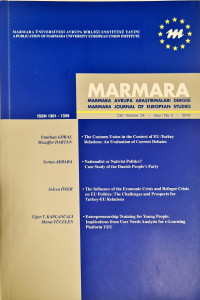NATIONALIST OR NATIVIST POLITICS? CASE STUDY OF THE DANISH PEOPLE’S PARTY
Abstract
Radical right-wing European parties are developing politics of resistance, criticism, and a certain amount of backlash, either towards European integration or, more broadly, towards globalisation. Nonetheless, and as addressed in this article, the question is in what context do radical right-wing parties pursue these policies? Is it a national backlash or an attempt at cultural reproduction in an era of acculturation within multiple civil societies of the European Union (EU)? In becoming more transnational in terms of customs,capital, and people flowing across borders, it is becoming increasingly difficult to analyse radical right-wing European politics via modern nationalism. For this very reason, this article attempts to clarify the politics of the radical right via nativism, thereby opening a debate about the native and non-native within the European context. The article supports this hypothesis with the case of the Danish Peoples Party (DPP). According to the findings reported in this article, the nativist politics pursued by the DPP exceeds the ordinary definition of ‘nation,’ defining both ‘Danishness’ and ‘Europeaness’ in terms of nativism in Europe, rather than in terms of nationalism.
References
- McNeill, W. H. (1986) History of Western Civilization, (University of Chicago Press: Chicago).
- Meret, S. (2007) “The Danish People’s Party, the Italian Northern League and the Austrian Freedom Party in a Comparative Perspective: Party Ideology and Electoral Support’’, SPIRIT PhD Series, Thesis no. 25.
- Mudde, C. (2007) Populist Radical Right Parties in Europe, (Cambridge University Press: Cambridge).
NATIONALIST OR NATIVIST POLITICS? CASE STUDY OF THE DANISH PEOPLE’S PARTY
Abstract
Radical right-wing European parties are developing politics of resistance,
criticism, and a certain amount of backlash, either towards European
integration or, more broadly, towards globalisation. Nonetheless, and as
addressed in this article, the question is in what context do radical right-wing
parties pursue these policies? Is it a national backlash or an attempt at cultural
reproduction in an era of acculturation within multiple civil societies of the
European Union (EU)? In becoming more transnational in terms of customs,
capital, and people flowing across borders, it is becoming increasingly difficult
to analyse radical right-wing European politics via modern nationalism. For
this very reason, this article attempts to clarify the politics of the radical right
via nativism, thereby opening a debate about the native and non-native within
the European context. The article supports this hypothesis with the case study
of the Danish Peoples Party (DPP). According to the findings reported in this
article, the nativist politics pursued by the DPP exceeds the ordinary definition
of ‘nation,’ defining both ‘Danishness’ and ‘Europeaness’ in terms of nativism
in Europe, rather than in terms of nationalism.
References
- McNeill, W. H. (1986) History of Western Civilization, (University of Chicago Press: Chicago).
- Meret, S. (2007) “The Danish People’s Party, the Italian Northern League and the Austrian Freedom Party in a Comparative Perspective: Party Ideology and Electoral Support’’, SPIRIT PhD Series, Thesis no. 25.
- Mudde, C. (2007) Populist Radical Right Parties in Europe, (Cambridge University Press: Cambridge).
Details
| Primary Language | English |
|---|---|
| Journal Section | Makaleler |
| Authors | |
| Publication Date | December 30, 2016 |
| Published in Issue | Year 2016 Volume: 24 Issue: 2 |

